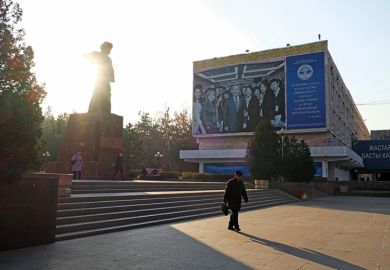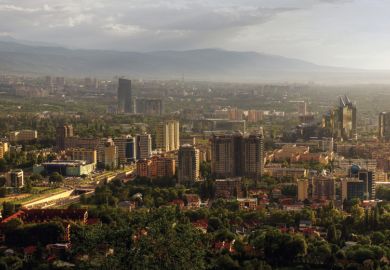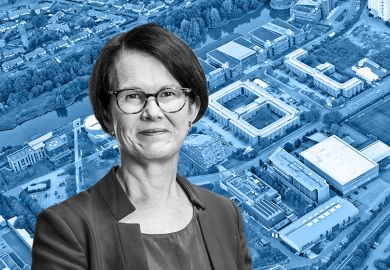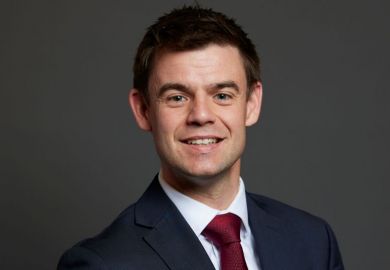The position of Nazarbayev University, named after Kazakhstan’s president, is unique. Set up in 2010 to be a “beacon” for higher education in the central Asian country, it has far more autonomy than neighbouring institutions – for which the inherited Soviet system of centralised governance still lingers – but also far more government funding.
Loretta O’Donnell, the university’s vice-provost for academic affairs, said that Nursultan Nazarbayev – who has led the country since the collapse of the Soviet Union 28 years ago – recognised that his university would need to be seen to have academic freedom if it was to pull its weight on the world stage.
However, for Dr O’Donnell – who swapped a role at the University of New South Wales’ business school for the Kazakh capital Astana in 2013 – proving that Nazarbayev University upholds academic integrity will be the most important factor in gaining international recognition.
Academic integrity in various guises has proved problematic for former Soviet countries, which have struggled to reform dated management and employment practices as they bid to transform their higher education systems and boost their economies. Cheating, plagiarism, corruption and bribery claims in particular have blighted Kazakhstan’s higher education reputation in the past, with admissions and assessment procedures proving regular flashpoints.
In response, Nazarbayev has made academic integrity a central focus of its entrance policy and operates “absolute merit-based admissions”, Dr O’Donnell said. The university is consciously creating an environment in which short cuts are not acceptable, according to Dr O’Donnell, who was adamant that money will not get students from the oil-rich region entry on to courses.
Its foundation courses, which most students complete before starting their degrees at the university, not only aim to boost students’ English language skills and academic writing skills, but also teach them about the importance of academic integrity, she added.
Alongside Al-Farabi Kazakh National University in Almaty, Nazarbayev has been running academic integrity conferences, and the institutions are now developing a Kazakh “integrity league” together.
“It’s for universities that are serious about the issue. It’s early days but it will be self-monitoring: keeping ourselves accountable and holding ourselves to really high standards,” Dr O’Donnell said.
“We want to make sure that our students and our faculty understand that if you want the benefits of international recognition and reputation, the rules are actually very clear. We have policies, we uphold them, we dismiss students for cheating, we do all these things.
“Everything we do, we try to do to international standards, to create opportunities for ‘brand Kazakhstan’ to be well known and well respected, so that graduates from our universities can really make their place in the world,” Dr O’Donnell continued. “Yes, we make mistakes, but we are learning from them and moving forward.”
The moves were fully supported by the students, she claimed. “They want to study where other good students study, they want fairness, they want transparency, they don’t want short cuts to be acceptable,” she said.
The autonomy enjoyed by Nazarbayev is now spreading to other universities, too. While the re-election of Mr Nazarbayev for a fourth term in 2015 attracted criticism from foreign observers for the lack of genuine opposition candidates (the president got 97 per cent of the vote), the same trend in higher education was highlighted in a book published last year by US academics who have advised Kazakhstan’s government.
“It used to be that 20 per cent of the curriculum could be developed by a university and 80 per cent mandated by the ministry, but those proportions are shifting,” Dr O’Donnell said. “I’d say it’s about 40-60 now and over time other universities will reach the same degree we have.”
But Dr O’Donnell is under no illusions that Nazarbayev University is perfect. Problems that she didn’t face in Australia include what she reluctantly called “paper-based bureaucracy”. The infrastructure isn’t as smooth as it could be, with the inner workings of the university still paper-based, rather than computer-based, she said.
“Because all of our systems have been inherited from the Soviet system, it slows us down a bit,” she said.
She concluded: “We’re very conscious that we’re not perfect but it’s quite clear that universities can be powerful levers for change and this part of the world is really starting to be put on the map.”
Register to continue
Why register?
- Registration is free and only takes a moment
- Once registered, you can read 3 articles a month
- Sign up for our newsletter
Subscribe
Or subscribe for unlimited access to:
- Unlimited access to news, views, insights & reviews
- Digital editions
- Digital access to THE’s university and college rankings analysis
Already registered or a current subscriber? Login








